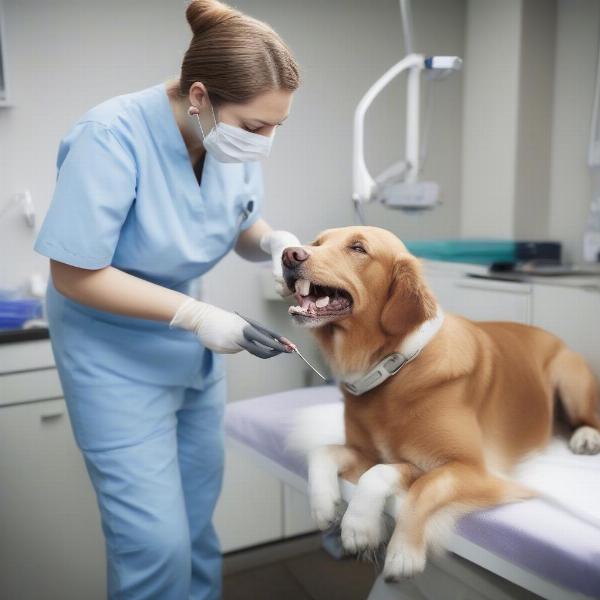Dog toothaches are a common but often overlooked problem. Just like humans, dogs can suffer from tooth pain, and it’s crucial for owners to recognize the signs and seek veterinary attention. Ignoring a dog toothache can lead to more serious dental issues, impacting their overall health and well-being. This guide will help you understand the common symptoms, causes, and treatment options for dog toothaches.
Recognizing the Signs: How to Tell if Your Dog Has a Toothache
Identifying a toothache in your dog can be challenging since they can’t tell us where it hurts. However, several tell-tale signs can indicate dental discomfort. Watch out for changes in your dog’s eating habits, such as dropping food, chewing on one side of their mouth, or a decreased appetite.
Other common symptoms include excessive drooling, pawing at the mouth, facial swelling, bad breath, and reluctance to play with toys. Changes in behavior, like increased irritability or withdrawal, can also be indicators of pain.
Common Causes of Toothaches in Dogs
Several factors can contribute to toothaches in dogs. Periodontal disease, a bacterial infection affecting the gums and supporting structures of the teeth, is a leading cause. Dental fractures, often caused by chewing on hard objects, can also result in significant pain. Abscesses, infections at the root of the tooth, are another common culprit. Less frequent causes include tumors and retained baby teeth.
What to Do If You Suspect a Toothache
If you notice any of these signs, it’s crucial to schedule a veterinary appointment as soon as possible. Delaying treatment can lead to more severe complications, including tooth loss and systemic infections.
Veterinary Diagnosis and Treatment Options
Your veterinarian will perform a thorough oral examination to determine the cause of the toothache. They may recommend dental X-rays to assess the extent of any underlying damage. Treatment options vary depending on the specific diagnosis. Periodontal disease is often treated with professional cleaning and antibiotics. Fractured teeth may require extraction or root canal therapy. Abscesses usually necessitate drainage and antibiotics.
 Veterinarian examining dog teeth
Veterinarian examining dog teeth
Preventing Toothaches: Proactive Dental Care for Your Canine Companion
Maintaining good oral hygiene is essential for preventing toothaches in dogs. Regular brushing with dog-specific toothpaste, offering dental chews, and providing a balanced diet can significantly reduce the risk of dental problems. Scheduling routine dental checkups with your veterinarian is also crucial for early detection and treatment of any potential issues. You can find more information on dog-friendly diets at naked dog food.
Conclusion
Recognizing the symptoms of a dog toothache is vital for ensuring your furry friend’s well-being. Prompt veterinary care can alleviate pain and prevent more serious complications. By understanding the causes and implementing preventative measures, you can help your dog maintain a healthy and happy smile. Remember, a healthy mouth contributes to a healthy dog! Read more about why your dog might be rubbing their face at why do dogs rub their face and if your dog is shaking and not eating, check out why is my dog shaking and not eating. If you suspect your dog has a broken tooth, visit dog has broken tooth for more information.
FAQs
- How can I tell if my dog has a toothache? Look for changes in eating habits, excessive drooling, pawing at the mouth, bad breath, and behavioral changes.
- What causes toothaches in dogs? Periodontal disease, fractures, abscesses, tumors, and retained baby teeth.
- What should I do if I think my dog has a toothache? Schedule a veterinary appointment immediately.
- How are dog toothaches treated? Treatment depends on the cause and may include cleaning, antibiotics, extractions, or root canal therapy.
- How can I prevent toothaches in my dog? Brush their teeth regularly, offer dental chews, provide a balanced diet, and schedule regular veterinary checkups.
- Can I give my dog human pain medication for a toothache? No, never give your dog human medication without consulting your vet. Many human pain relievers are toxic to dogs.
- Are there any specific breeds prone to toothaches? Smaller breeds and those with crowded teeth are often more susceptible to dental problems.
ILM Dog is a leading online resource for dog owners worldwide, offering expert advice on all aspects of canine care, including breed selection, health, training, nutrition, grooming, and much more. From puppy care to senior dog support, we provide practical, reliable information to help you give your furry friend the best possible life. For specific symptoms like those mentioned above, you can visit our article on toothache dogs symptoms Contact us at [email protected] or +44 20-3965-8624 for expert guidance and support. Visit ILM Dog today!